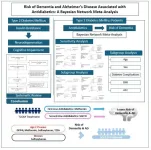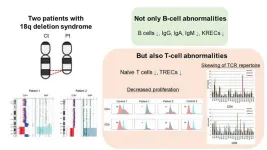(Press-News.org) Ann Arbor, July 11, 2024 – Investigators analyzing the potential cognitive effects of antidiabetic medications in records of more than 1.5 million patients with type 2 diabetes mellitus (T2DM) found risks of dementia and Alzheimer’s disease (AD) were significantly lower in patients treated with metformin and sodium glucose co-transporter-2 inhibitors (SGLT-2i) compared to other antidiabetic drugs. Their results appear in the American Journal of Preventive Medicine, published by Elsevier.
T2DM has become a critical health issue, affecting around 530 million patients worldwide. Growing evidence demonstrates there is at least a 50% increased risk of cognitive impairment and dementia in patients with T2DM, manifested as impaired executive function, memory, and attention. Dementia itself is also a crucial health issue, affecting more than 40 million patients worldwide.
Lead investigator Yeo Jin Choi, PharmD, PhD, Department of Pharmacy, College of Pharmacy; Department of Regulatory Science, Graduate School; and Institute of Regulatory Innovation Through Science (IRIS), Kyung Hee University, Seoul, Korea, explains, "As the prevalence of both diabetes and dementia continues to rise each year, and with mounting evidence suggesting a strong correlation between diabetes and dementia, the need for comprehensive research in dementia risk associated with antidiabetic treatment becomes increasingly imperative. Understanding the potential cognitive effects of antidiabetic medications is not only crucial for optimizing patient care but also for informing regulatory decisions and clinical practice guidelines to prioritize patient safety and promote public health.”
Investigators searched the Cochrane Central Register of Controlled Trials, Embase, MEDLINE (PubMed), and Scopus from inception to March 2024 to identify observational studies investigating incidence of dementia and AD in patients after initiation of antidiabetic drugs. A total of 1,565,245 patients from 16 studies were included. They performed Bayesian network meta-analysis to determine the risk of dementia and AD associated with antidiabetics and synthesized data to compare the risk of dementia and AD associated with six antidiabetic drug classes: DPP4 inhibitors, metformin, SGLT-2 inhibitors, sulfonylureas, alpha-glucosidase inhibitors, and thiazolidinediones.
Earlier studies had suggested an increased risk of dementia from the use of antidiabetic drugs, particularly with agents with high hypoglycemic risks, such as sulfonylurea and alpha-glucosidase inhibitors. The evidence regarding dementia risk associated with SGLT-2 inhibitors was limited prior to this study.
The lowest risk of dementia and AD in this novel study was found in patients on metformin. In addition, SGLT-2 inhibitors, which include Farxiga® and Jardiance®, were associated with a lower risk of dementia and AD as well as cardiovascular health benefits.
Dementia risk associated with SGLT-2 inhibitors was similar to other antidiabetic medications in patients less than 75 years of age. However, the risk of dementia was substantially higher with dipeptidyl peptidase IV (DPP4) inhibitors, metformin, sulfonylureas, and thiazolidinedione (TZD) compared to SGLT-2 inhibitors in patients aged 75 years or older. Dementia risk was also significantly lower with SGLT-2 inhibitors compared to sulfonylureas in women.
The investigators note that dementia and AD risks associated with second- or third-line antidiabetics, including GLP-1 agonists and insulin, were not evaluated in this study.
This research contributes to a more comprehensive understanding of diabetes management, emphasizing the importance of considering both metabolic and cognitive health outcomes in clinical practice. It highlights the importance of individualized treatment approaches in diabetes management, taking into account patient-specific factors such as age, sex, complications, body mass index (BMI), glycated hemoglobin (A1C), which measures blood glucose levels over the previous three months, and cognitive health status, informing healthcare professionals in their decision-making process when selecting appropriate treatment options for patients with diabetes.
Yeo Jin Choi concludes, “We were quite surprised by the study results, particularly the potential cognitive benefits of SGLT-2 inhibitors over metformin and DPP-4 inhibitors in patients aged 75 years or older. This finding is particularly notable given that SGLT-2 inhibitors are currently used for heart failure management as well. Our study contributes to the existing evidence by suggesting potential additional benefits of SGLT-2 inhibitors in mitigating dementia risk, thereby providing significant clinical implications for diabetes management. Elderly patients aged 75 years or older may particularly benefit from these findings, since they often face greater cognitive health concerns.”
END
Metformin and other antidiabetic drugs can help reduce the risk of dementia in patients with type 2 diabetes
Analysis of more than 1.5 million records of patients with type 2 diabetes casts light on the risk of dementia and Alzheimer’s disease and potential benefits associated with antidiabetic treatment, reports the American Journal of Preventive Medicine
2024-07-11
ELSE PRESS RELEASES FROM THIS DATE:
First ever 3D reconstruction of 52,000-year-old woolly mammoth chromosomes thanks to serendipitously freeze-dried skin
2024-07-11
An international research team has assembled the genome and 3D chromosomal structures of a 52,000-year-old woolly mammoth—the first time such a feat has been achieved for any ancient DNA sample. The fossilized chromosomes, which are around a million times longer than most ancient DNA fragments, provide insight into how the mammoth’s genome was organized within its living cells and which genes were active within the skin tissue from which the DNA was extracted. This unprecedented level of structural detail was retained because ...
Climate change: Thick sea ice flowing from Arctic Ocean shortening shipping season in Northwest Passage
2024-07-11
An increased amount of thick sea ice flowing south from the Arctic Ocean shortened the ice-free shipping season in several parts of the Northwest Passage between 2007 and 2021, according to an analysis in Communications Earth & Environment. The authors suggest this could mean the Northwest Passage is unlikely to become a viable alternative to traditional shipping routes, despite previous hopes that it may become viable due to global warming.
The Northwest Passage (NWP) is a commercial shipping route connecting the Atlantic and Pacific Oceans that runs through the Arctic Circle north of North America. Through the Canadian ...
State gun laws have mixed impact on suicide and homicide rates
2024-07-11
DURHAM, N.C. – Certain state gun laws are associated with decreased suicide rates for children under age 18, but the laws have little influence on homicide rates, according to a study from Duke Health researchers examining the relationship between gun laws and child deaths.
Since 2020, firearms rank as the leading cause of death among U.S. children ages 1-18, raising the need for research to help guide prevention efforts.
“Our analysis of suicide and homicide mortality data from ...
Treatment approaches for opioid use disorder offered in us substance use treatment facilities
2024-07-11
About The Study: Substance use treatment facilities reported significant gaps in provision of effective treatments for opioid use disorder (OUD). More than one-third of facilities did not offer medications for OUD (MOUD) and less than half offered multiple MOUD types, limiting MOUD treatment options for patients and clinicians.
Corresponding Author: To contact the corresponding author, Tae Woo Park, M.D., M.Sc., email parkt4@upmc.edu.
To access the embargoed study: Visit our For The Media website at this link https://media.jamanetwork.com/
(doi:10.1001/jama.2024.11913)
Editor’s ...
Secondhand nicotine absorption from E-cigarette vapor vs tobacco smoke in children
2024-07-11
About The Study: In this cross-sectional study of U.S. children, nicotine absorption was much lower in children who were exposed to secondhand vapor versus secondhand smoke, but higher than in those exposed to neither. These findings suggest that switching from smoking to vaping indoors may substantially reduce, but not eliminate, children’s secondhand exposure to nicotine and other noxious substances.
Corresponding Author: To contact the corresponding author, Harry Tattan-Birch, Ph.D., email h.tattan-birch@ucl.ac.uk.
To ...
Long-term outcomes of self-fit vs audiologist-fit hearing aids
2024-07-11
About The Study: This comparative effectiveness research study demonstrated that self-fit over-the-counter hearing aids can offer comparable long-term benefits to audiologist-fit hearing aids for individuals with mild to moderate hearing loss.
Corresponding Author: To contact the corresponding author, Karina C. De Sousa, Ph.D., email karina.swanepoel@up.ac.za.
To access the embargoed study: Visit our For The Media website at this link https://media.jamanetwork.com/
(doi:10.1001/jamaoto.2024.1825)
Editor’s Note: Please ...
Second-hand vaping exposure very low compared to second-hand smoking
2024-07-11
Children exposed to vaping indoors absorb less than one seventh the amount of nicotine as children who are exposed to indoor smoking, but more than those exposed to neither, according to a new study led by UCL researchers.
The study, published in JAMA Network Open and funded by Cancer Research UK, looked at blood tests and survey data for 1,777 children aged three to 11 in the United States.
The researchers said that second-hand exposure to harmful substances in e-cigarettes would likely be much lower still, as e-cigarettes deliver similar levels of nicotine to tobacco but contain only a fraction of the toxicants and ...
Biological science helps fuel the future of electric air travel
2024-07-11
– By William Ferguson
When it comes to figuring out why electric aircraft batteries lose power over time, one typically wouldn’t think to turn to a decades-old approach biologists use to study the structure and function of components in living organisms. However, it turns out that omics, a field that helped scientists unravel the secrets of the human genome, could also soon play a key role in making carbon-free air travel a reality.
In a new study in the journal Joule, a team of researchers led ...
Electric aviation: Batteries that stay strong for the flight duration
2024-07-11
Images
A battery component innovation could help keep power delivery high when electric aircraft land with low charge, according to a study led by Lawrence Berkeley National Laboratory with expertise from the University of Michigan.
The research provides a solution to a problem identified in 2018 in a study led by Venkat Viswanathan, a professor of aerospace engineering at U-M and a coauthor of the new work published in Joule.
"Both takeoff and landing require high power, and landing is more challenging because you’re not fully charged," Viswanathan said. "To get high power you ...
Uncovering late-onset combined immune deficiency in chromosome 18q deletion syndrome
2024-07-11
Tokyo Medical and Dental University (TMDU) researchers have discovered that patients with 18q deletion syndrome can experience both cellular and humoral immunodeficiency
Tokyo, Japan – Chromosome 18q deletion (18q del) syndromeis a rare genetic condition disorder, affecting approximately 1 in 40,000 to 55,000 individuals, caused by the deletion of genetic material on the long arm of chromosome 18. This genetic anomaly disrupts normal growth and development, and critically, can impair the immune system's functionality. Patients with 18q del syndrome often exhibit humoral immunodeficiency or a common ...
LAST 30 PRESS RELEASES:
Cal Poly’s fifth Climate Solutions Now conference to take place Feb. 23-27
Mask-wearing during COVID-19 linked to reduced air pollution–triggered heart attack risk in Japan
Achieving cross-coupling reactions of fatty amide reduction radicals via iridium-photorelay catalysis and other strategies
Shorter may be sweeter: Study finds 15-second health ads can curb junk food cravings
Family relationships identified in Stone Age graves on Gotland
Effectiveness of exercise to ease osteoarthritis symptoms likely minimal and transient
Cost of copper must rise double to meet basic copper needs
A gel for wounds that won’t heal
Iron, carbon, and the art of toxic cleanup
Organic soil amendments work together to help sandy soils hold water longer, study finds
Hidden carbon in mangrove soils may play a larger role in climate regulation than previously thought
Weight-loss wonder pills prompt scrutiny of key ingredient
Nonprofit leader Diane Dodge to receive 2026 Penn Nursing Renfield Foundation Award for Global Women’s Health
Maternal smoking during pregnancy may be linked to higher blood pressure in children, NIH study finds
New Lund model aims to shorten the path to life-saving cell and gene therapies
Researchers create ultra-stretchable, liquid-repellent materials via laser ablation
Combining AI with OCT shows potential for detecting lipid-rich plaques in coronary arteries
SeaCast revolutionizes Mediterranean Sea forecasting with AI-powered speed and accuracy
JMIR Publications’ JMIR Bioinformatics and Biotechnology invites submissions on Bridging Data, AI, and Innovation to Transform Health
Honey bees navigate more precisely than previously thought
Air pollution may directly contribute to Alzheimer’s disease
Study finds early imaging after pediatric UTIs may do more harm than good
UC San Diego Health joins national research for maternal-fetal care
New biomarker predicts chemotherapy response in triple-negative breast cancer
Treatment algorithms featured in Brain Trauma Foundation’s update of guidelines for care of patients with penetrating traumatic brain injury
Over 40% of musicians experience tinnitus; hearing loss and hyperacusis also significantly elevated
Artificial intelligence predicts colorectal cancer risk in ulcerative colitis patients
Mayo Clinic installs first magnetic nanoparticle hyperthermia system for cancer research in the US
Calibr-Skaggs and Kainomyx launch collaboration to pioneer novel malaria treatments
JAX-NYSCF Collaborative and GSK announce collaboration to advance translational models for neurodegenerative disease research
[Press-News.org] Metformin and other antidiabetic drugs can help reduce the risk of dementia in patients with type 2 diabetesAnalysis of more than 1.5 million records of patients with type 2 diabetes casts light on the risk of dementia and Alzheimer’s disease and potential benefits associated with antidiabetic treatment, reports the American Journal of Preventive Medicine



